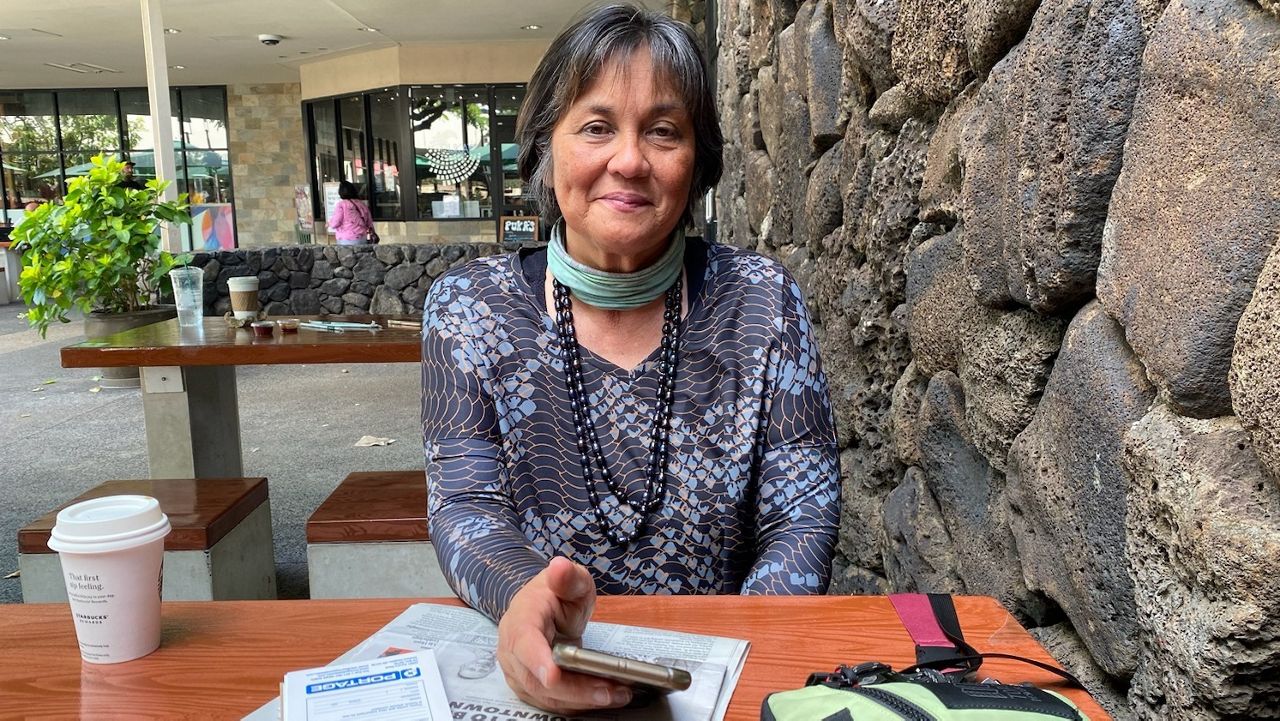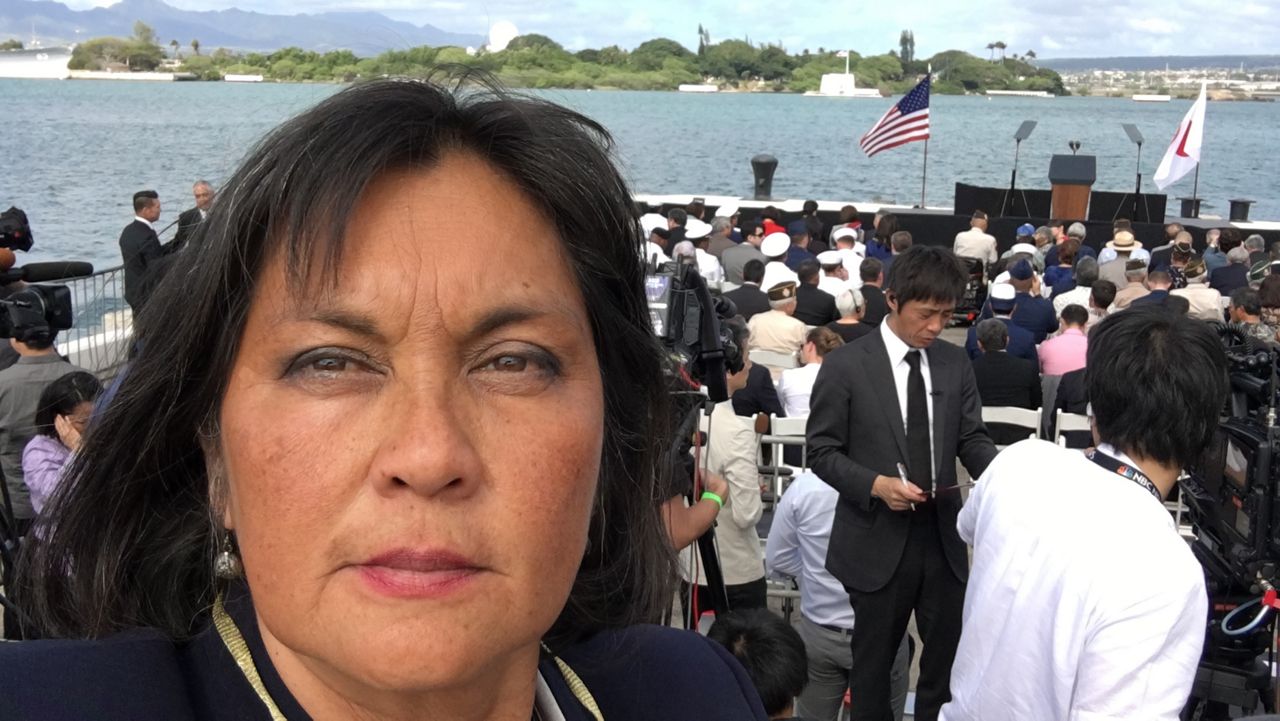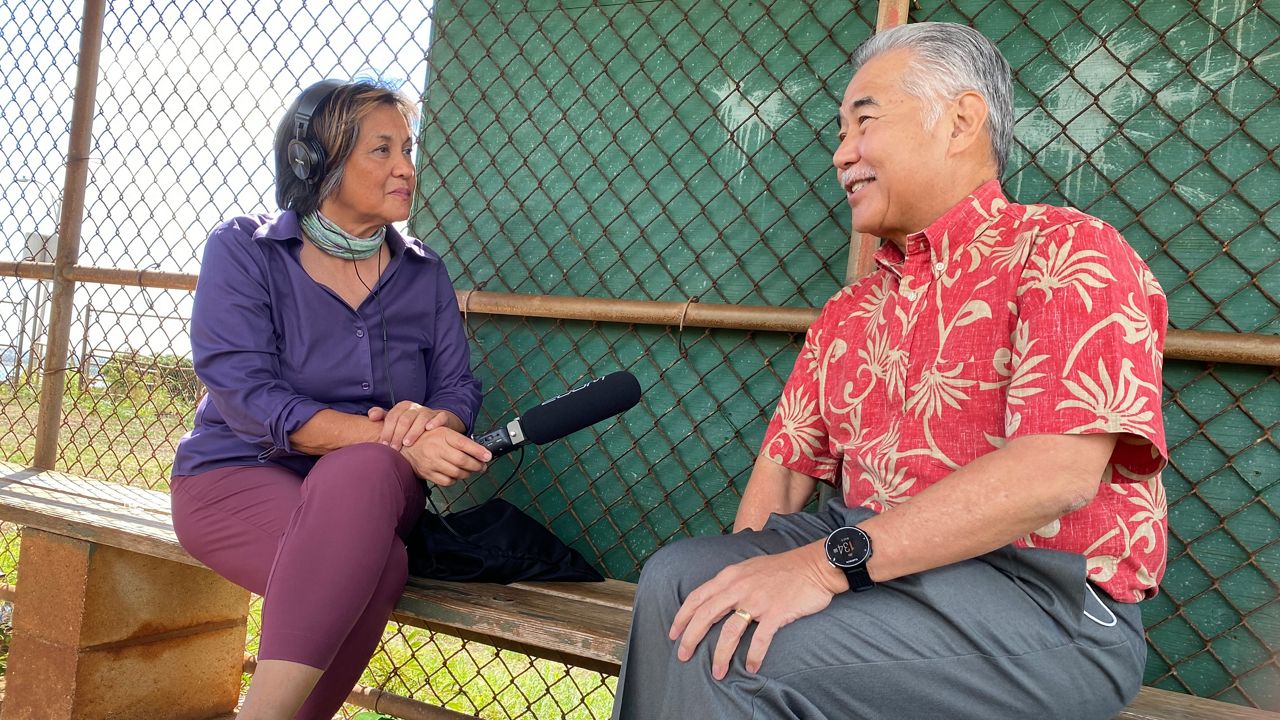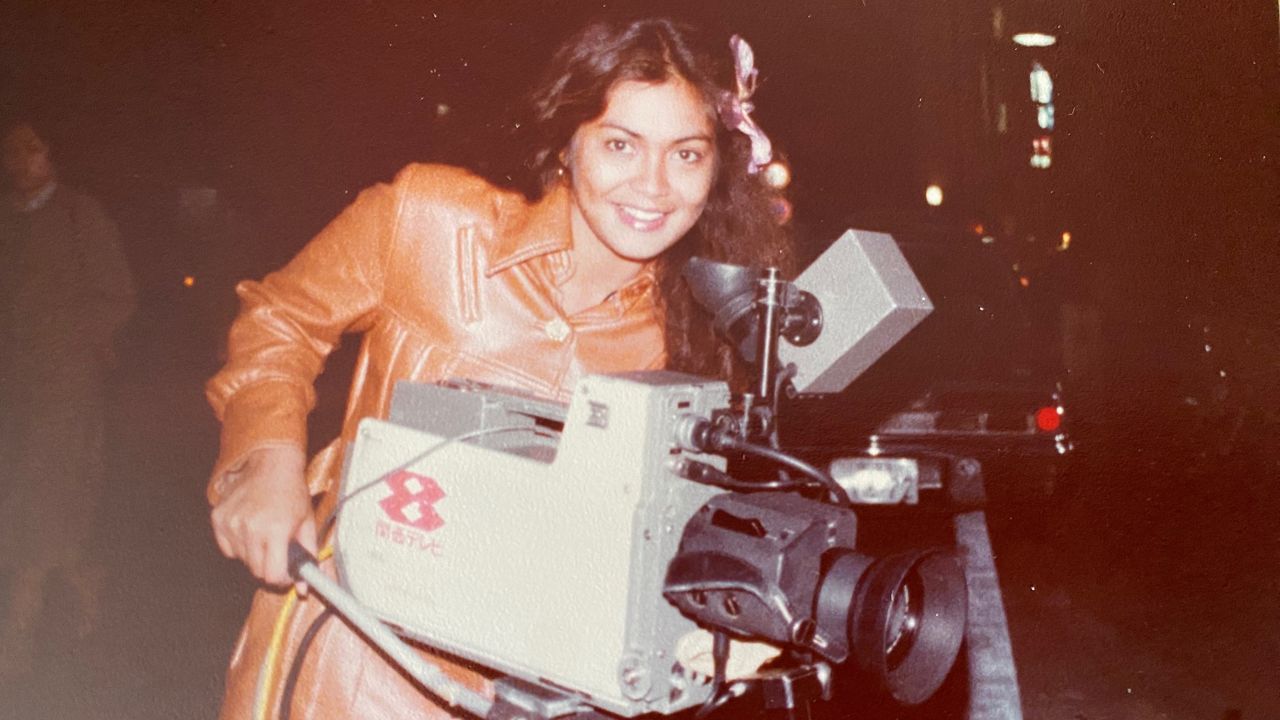This profile is the second in a series on women journalists in Hawaii. Read the first story on Denby Fawcett, who reported on Vietnam when she was 24.
With over four decades as a news reporter, Catherine Cruz has had a front seat to Hawaii’s history. She is most proud of the stories about people at pivotal moments in their lives.
At the beginning of her career, KITV would send Cruz to cover bankruptcy court, which she dreaded. “I don’t like court, and I don’t like numbers,” she recalled.
However, bankruptcy court ended up uncovering highly emotional stories. She reported on the closure of the Hamakua Sugar Company on Hawaii Island in 1994 when hundreds of cane workers lost their jobs, and a way of life ended.
“I was fortunate enough to see that slice of life out there,” Cruz said, shedding tears.
She recalls when the Dole Plantation’s pineapple cannery in Iwilei closed in 1992, reporting on the “last lunch,” a thank-you meal hosted by the cannery for the pineapple workers.
“I just remember seeing all the women giving each other hugs, because they thought this was going to be the last time they saw each other,” said Cruz.
She remembers the last days at Liberty House in 2001, Aloha Airlines in 2008, and the Honolulu Advertiser in 2010.
“Some of the bankruptcies are the most powerful stories that I remember because they’re people stories,” said Cruz. “Their lives changed because the company shut down.”

The radio host and former TV news reporter got her start in 1978. When she was 20 years old and attending college in California, she returned home to Guam for the summer and got a job at the TV station KUAM.
“I wanted to work behind the camera. I wanted to shoot and edit. And they said, ‘Well, we don’t have that many openings in production, but we have openings in news. Can you just help out?’ So I did and then I got hooked on news,” said Cruz.
By the end of the summer, KUAM offered her a job, so she ended up staying on as a reporter for two years. After earning a bachelor’s degree in broadcast journalism at San Francisco State University, Cruz moved to Hawaii in 1982, which she said seemed like a natural choice, as Guam and Hawaii have many similarities, describing that they are both islands with a large military presence and tourist industry. She quickly landed a job at KITV.
“When I came there, (the female reporters) had just ended a strike. The female reporters were being paid less than men,” said Cruz. “I do feel very fortunate they fought that fight, and then I was able to benefit from that.”
At KITV, Cruz first worked as a city hall reporter, which she described as “really good training.”
“You walk into a room and you’re forced to be a quick study,” said Cruz. “I’ve always loved breaking news because you’re just thrown into a situation and you really got to figure out what’s happening.”
Cruz never aspired to be a news anchor because she loved being in the field.
“You see things, you learn things, you get to be with people that most people never do, you run in circles that most people never really get access to,” said Cruz.
Cruz has been everywhere, from the Navy’s Red Hill Bulk Fuel Storage Facility, getting a tour in 2020 after asking for about six years, to a homeless encampment in the tall grass of Wahiawa, where people are dealing drugs and pit bulls are running around.
“I’ve never really felt uncomfortable going anywhere (or) dealing with a different group,” said Cruz.

“I remember having to cover a murder or something up in the North Shore and the photographer was very scared, because he’s like, ‘Oh, it’s a lot of Micronesians.’ I’m like, ‘so technically, I’m Micronesian,’” said Cruz.
Cruz, who is Chamorro, said while growing up on Guam, she went to school with children from Palau, Pohnpei, Chuuk and other places in Micronesia. In Hawaii, Micronesians are a fast-growing immigrant population who face discrimination and stereotypes. In her reporting, Cruz said she tries to highlight the many layers and positive aspects of the community.
“Everybody lumps them into one category and they’re all different. They all speak different languages. They look different. You just have to respect that,” said Cruz.
In 2020, Cruz reported on how Pacific Islanders were disproportionately affected by the pandemic. She interviewed a Marshallese doctor, Dr. Sheldon Riklon, who graduated from the University of Hawaii at Manoa’s John A. Burns School of Medicine and was recruited in 2016 to work in Arkansas, where many people from the Marshall Islands have immigrated for employment opportunities at the Tyson chicken factory. In Arkansas, he hosted a monthly radio show focused on educating the Marshallese community about COVID-19.
“He’s helping to serve his community during the pandemic,” said Cruz. “I thought that was a fabulous thing.”
In 1991, Cruz helped launch Pacific Islanders in Communication in Honolulu, a national nonprofit media organization that funds projects by Pacific Islander storytellers.
While she was in college in California, Cruz took part in a similar nonprofit, Pacific Educational Network, interviewing Mufi Hanneman, when he was “a young man,” who “was a role model for the Samoan community,” and the late Noa Emmett Aluli, when he was involved in the movement to stop military use of Kahoolawe. Unfortunately, PEN shuttered, but Cruz and others in Hawaii created a working group to resurrect it as Pacific Islanders in Communication.
“I remembered how it helped me in school, and I just thought it was worthwhile, and so they started up again, and helped other people,” said Cruz.

Along with her successful career, Cruz is a mother of two kids born in 1989 and 1992. At KITV, she was the first person in about a decade or more to get pregnant and was nervous about what it would be like to be a working mom. She worked up to her due date.
“It was hard juggling the kids. I was fortunate because there was a preschool right around KITV,” Cruz said. “This place was open from 6 a.m. to 6 p.m.”
She sometimes had to pick up her kids from preschool before it closed — “that’s the deadline” — and bring them into KITV’s office to finish a reporting assignment.
“It was very, very hard, but I made it work and have no regrets,” said Cruz.
In 2017, Cruz moved from TV news to radio, inspired by her grown children telling her to “try podcasting.” Now, she hosts “The Conversation,” a one-hour show on Hawaii Public Radio weekdays at 11 a.m. Listeners can also tune into the show as a podcast on Google, Apple, Spotify or Stitcher.
“We have a pulse on what’s going on in the community,” she said.
After 45 years in the news business, Cruz said she is still “hooked on news.” She will make more than 30 calls a day, talking to different people in the community to find out what is happening in Hawaii and looking for her next story.
When asked what advice she would give young journalists, Cruz said, “be persistent.”
Michelle Broder Van Dyke covers the Hawaiian Islands for Spectrum News Hawaii. Email her at michelle.brodervandyke@charter.com.
